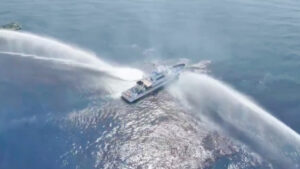
By Kenneth Christiane L. Basilio, Reporter
THE US and its allies ought to restrict China’s entry to expertise and knowledge to curb its expansionist ambitions within the South China Sea by means of coordinated navy deterrence, a former US safety official mentioned on Monday.
“It will be higher to constrain and mood Xi Jinping’s ambitions now by means of strong coordinated navy deterrence and thru strict limits on China’s entry to expertise, capital and knowledge managed by our international locations,” mentioned Matthew Forbes Pottinger, a former deputy Nationwide Safety adviser to US President Donald J. Trump.
“That’s higher than ready till Xi Jinping has taken fateful and irrevocable steps, similar to attacking Taiwan that may result in a struggle between superpowers,” he mentioned in a video message at a parliamentary intelligence-security discussion board in Manila.
The Chinese language Embassy in Manila didn’t instantly reply to a Viber message searching for remark.
China claims virtually your entire South China Sea, together with components claimed by the Philippines, Brunei, Malaysia, Taiwan and Vietnam. It asserts its sovereignty declare by means of an armada of coast guard ships, regardless of a United Nations-backed courtroom ruling in 2016 that voided its declare for being unlawful.
Mr. Pottinger mentioned international locations ought to communicate out in opposition to Beijing’s actions that undermine the sovereignty of its neighbors. “It’s vital to talk brazenly and loudly if we’re to forestall Xi Jinping from making grave miscalculations.”
The Philippines has contested China’s sweeping declare within the waterway by means of diplomatic channels by submitting greater than 190 diplomatic protests since President Ferdinand R. Marcos, Jr. took workplace in 2022.
“Gratuitous efforts to flatter and reassure Beijing are prone to be taken as indicators of weak point,” Mr. Pottinger mentioned.
International locations must also take into account banning Chinese language-made apps similar to TikTok and WeChat to forestall Beijing from conducting what he described as “info warfare” and weaken its “discourse energy.”
“All we have to do is forestall Beijing’s platforms from manipulating our discourse at residence, whereas making it simpler for Chinese language residents to speak safely with each other and with the surface world,” he added.
Washington is in a “chilly struggle” with Beijing amid its rising assertiveness within the contested South China Sea, mentioned Carl Timothy Delfeld, chairman on the Hay Seward Financial Safety Council.
‘SILK CURTAIN’
“Are we in a second Chilly Battle with China?” he instructed the discussion board. “Briefly, we’re. However it’s a really completely different Chilly Battle than the one with the Soviet Union. We don’t have an ‘iron curtain’ within the Western Pacific. We’ve what I confer with as a ‘silk curtain.’”
The iron curtain was a political, navy and ideological boundary that separated the Soviet Union from the West after World Battle II.
Mr. Delfeld described China’s encroachment of the waterway as a silk curtain because of the threat of battle in contested areas. “A silk curtain is flammable, which means there are flash factors from the East China Sea to Taiwan and to the Philippines within the South China Sea.”
“It’s versatile, so it strikes backward and forward relying on the winds of change, occasions and alliances, that are consistently shifting,” he added.
He mentioned the movement of commerce within the South China Sea makes controlling it tougher. About $3 trillion value of ship-borne commerce passes by means of the waterway yearly.
“You may have commerce, you might have capital, you might have tourism,” he mentioned. “So it’s rather more troublesome. The problem is who’s going to regulate the movement by means of the silk curtain.”
Manila has used a so-called transparency initiative to boost public consciousness and spotlight its rights within the disputed waterway whereas additionally exposing “illegal Chinese language actions” together with aggressive habits and bullying, Philippine Coast Guard (PCG) Commandant Admiral Ronnie Gil L. Gavan instructed the identical discussion board.
“By exposing illegal and coercive habits, we forestall intimidation ways from working within the shadows,” he mentioned. “We made its reputational value greater.”
The Philippine Coast Guard on Sunday mentioned it had deployed an plane to verify the “unlawful presence” of two Chinese language vessels 63 kilometers from the coast of Pangasinan province dealing with the South China Sea within the nation’s north.
In a press release, the PCG mentioned its Islander plane confirmed the presence of the China Coast Guard (CCG) vessels with bow numbers 3301 and 3104 at 9:30 am on Sunday. “Notably, the CCG vessels didn’t reply to the radio problem issued by the PCG,” it added.
It mentioned two 44-meter PCG vessels — BRP Cabra and BRP Bagacay — have been dispatched to Bolinao, Pangasinan “to deal with the unlawful presence of the China Coast Guard.”
The vessels reinforce the Philippine authorities’s place in opposition to the “normalization of unlawful patrols” by China throughout the Philippines’ unique financial zone within the South China Sea.
The Philippines has accused China of intimidating Filipino fishermen close to Scarborough Shoal and normalizing its “unlawful presence” after Beijing despatched the monster ship into its unique financial zone (EEZ) on Jan. 4.
China has repeatedly accused Philippine vessels of encroachment on its territory. Bilateral ties are at their worst in years after repeated confrontations and heated diplomatic rows.
A United Nations-backed courtroom within the Hague voided China’s expansive claims within the South China Sea in 2016, because it dominated the shoal is a conventional fishing floor for Filipino, Chinese language and Vietnamese fishermen.